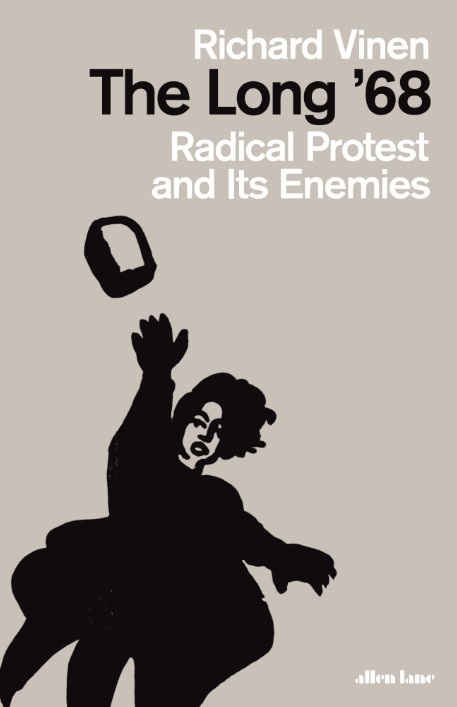Richard Vinen: The Long ’68 review - more impartial than impassioned | reviews, news & interviews
Richard Vinen: The Long ’68 review - more impartial than impassioned
Richard Vinen: The Long ’68 review - more impartial than impassioned
A study looks at Western Europe and the US on the edge of nervous breakdown 50 years on

Born into the late 1950s, I was too young to be a 68er, though I remember watching it all on TV: the protests in Red Lion Square and Grosvenor Square, where Tariq Ali and Vanessa Redgrave were the leading lights, demonstrating against Vietnam; Paris, where student protests, strikes and sit-ins quickly spread across the country, and General de Gaulle fled briefly to Germany; the riots across the United States that
Viewed from amid the chaos of our post-Brexit dis-United Kingdom, the governments over which she presided appear a model of competence: Thatcher helped invent the Single Market and would not have presided over its break-up; nor, I suspect, would she have allowed Britain’s relationship with Russia get to this unpretty pass. As for Trump – well, he possesses none of Reagan’s folksy charm and it’s hard to imagine her cap-in-hand at the White House.
In The Long '68: Radical Protest and Its Enemies, Richard Vinen tells us that Thatcher’s first “major political speech”, given in October 1968, mocked student radicals, notably Daniel Cohn-Bendit, one of their leaders, whose university paper had been praised by his professors. The speech is collected on the Thatcher Foundation website and I wonder why Vinen didn’t quote another sentence: “one of the effects of the rapid spread of higher education has been to equip people to criticise and question almost everything.” Marianne Faithfull says much the same thing in the Michael Caine documentary My Generation. Much of the 1960s (against which the Tories consistently inveigh) can be read as one long critique of our parents, the generation who had fought in World War Two. Hadn’t Bob Dylan, in one of his most famous songs, sung that their “old road was rapidly agin’” and advised them to “get out of the new one if you can’t lend a hand”?
Vinen’s previous book was National Service: A Generation in Uniform, 1945-1963 so you can see that for this King’s College, London, Professor of History, and for his editor, a book on the Sixties was in some ways the next logical step. I was looking forward to it but turned the pages feeling disappointed. You just don’t feel his heart is in the project or that he’s really in command of his material – perhaps not truly engaged with the subject. The book is about “the radical movements and rebellions of the late 1960s and early ‘70s” – where they came from, where they went. Without what at least one previous historian of the decade has called “the days of rage”, the decades since would have been very different – mostly for ill, social justice and equality even more retarded than it currently is. Does Vinen believe that? I'm not sure. Many would agree that les evenements brought about a social revolution in France, while the 68ers came to power in the Czechoslovakia 20 years later - Alexander Dubcek waving from a balcony overlooking Wenceslas Square in Prague following the Velvet Revolution of 1989 was the most emotive moment for me of that tumultuous year.
 He might argue that as an academic it’s his role to be impartial rather than impassioned – but a bit of enthusiasm would have gone a long way. Vinen’s style is dry and detached, with lots of cross-references and statistics, and a fractured narrative. As an attempt to “reconstruct the world that came and, largely, went in the late 1960s and early 70s”, it rather fails. The book is, he acknowledges, “primarily a synthesis of other people’s research”, with only a small amount of original research on Britain and France. Therein, I feel, lies the problem.
He might argue that as an academic it’s his role to be impartial rather than impassioned – but a bit of enthusiasm would have gone a long way. Vinen’s style is dry and detached, with lots of cross-references and statistics, and a fractured narrative. As an attempt to “reconstruct the world that came and, largely, went in the late 1960s and early 70s”, it rather fails. The book is, he acknowledges, “primarily a synthesis of other people’s research”, with only a small amount of original research on Britain and France. Therein, I feel, lies the problem.
I have many of the books to which he refers, and some to which he doesn’t. The best among them is The Sixties by the late Arthur Marwick, which marked the 30th anniversary of 1968 and which takes a long (800 pages) and holistic view of the period. Marwick was the founding Professor of History at the Open University, a now endangered institution which is arguably (perhaps unarguably) the greatest British “invention” of the 1960s, for which Harold Wilson and Jennie Lee deserve unending credit. Sadly Marwick died in 2006 and with him the OU Sixties Research Group, of which I had the privilege of being a visiting fellow. What would he make of 1968 now, viewed through the prism of the last ghastly 10 years? It was Marwick who coined the idea of “the long Sixties”, beginning in 1959 and ending in 1974 or ’75 with the oil crisis or the fall of Saigon: Vinen has appropriated that idea with his title – credit is due but not, I think, given.
The Long ’68 is more political per se, and there’s a case for saying that the book would have been more interesting (and more relevant) if Vinen had posited some ideas about ’68 and its relationship to ’08 and ’18, a period which has once again seen a rise in radical movements, such as Occupy, and new political parties in Spain, Italy and Greece. He quotes in the book’s closing pages Sarkozy’s goal of “liquidating the legacy of May ‘68” which he believed had brought the unbridled and unscrupulous capitalism of “short-term, money, speculation and… golden parachutes” to France.
The legacy of 1968 will far outlast anything Sarko accomplished and he’ll probably have plenty of time to reflect on all that.
- The Long '68: Radical Protest and Its Enemies by Richard Vinen (Allen Lane, £20)
- More book reviews on theartsdesk
rating
Share this article
The future of Arts Journalism
You can stop theartsdesk.com closing!
We urgently need financing to survive. Our fundraising drive has thus far raised £49,000 but we need to reach £100,000 or we will be forced to close. Please contribute here: https://gofund.me/c3f6033d
And if you can forward this information to anyone who might assist, we’d be grateful.

Subscribe to theartsdesk.com
Thank you for continuing to read our work on theartsdesk.com. For unlimited access to every article in its entirety, including our archive of more than 15,000 pieces, we're asking for £5 per month or £40 per year. We feel it's a very good deal, and hope you do too.
To take a subscription now simply click here.
And if you're looking for that extra gift for a friend or family member, why not treat them to a theartsdesk.com gift subscription?
more Books
 'We are bowled over!' Thank you for your messages of love and support
Much-appreciated words of commendation from readers and the cultural community
'We are bowled over!' Thank you for your messages of love and support
Much-appreciated words of commendation from readers and the cultural community
 Thomas Pynchon - Shadow Ticket review - Pulp Diction
Thomas Pynchon's latest (and possibly last) book is fun - for a while
Thomas Pynchon - Shadow Ticket review - Pulp Diction
Thomas Pynchon's latest (and possibly last) book is fun - for a while
 Justin Lewis: Into the Groove review - fun and fact-filled trip through Eighties pop
Month by month journey through a decade gives insights into ordinary people’s lives
Justin Lewis: Into the Groove review - fun and fact-filled trip through Eighties pop
Month by month journey through a decade gives insights into ordinary people’s lives
 Joanna Pocock: Greyhound review - on the road again
A writer retraces her steps to furrow a deeper path through modern America
Joanna Pocock: Greyhound review - on the road again
A writer retraces her steps to furrow a deeper path through modern America
 Mark Hussey: Mrs Dalloway - Biography of a Novel review - echoes across crises
On the centenary of the work's publication an insightful book shows its prescience
Mark Hussey: Mrs Dalloway - Biography of a Novel review - echoes across crises
On the centenary of the work's publication an insightful book shows its prescience
 Frances Wilson: Electric Spark - The Enigma of Muriel Spark review - the matter of fact
Frances Wilson employs her full artistic power to keep pace with Spark’s fantastic and fugitive life
Frances Wilson: Electric Spark - The Enigma of Muriel Spark review - the matter of fact
Frances Wilson employs her full artistic power to keep pace with Spark’s fantastic and fugitive life
 Elizabeth Alker: Everything We Do is Music review - Prokofiev goes pop
A compelling journey into a surprising musical kinship
Elizabeth Alker: Everything We Do is Music review - Prokofiev goes pop
A compelling journey into a surprising musical kinship
 Natalia Ginzburg: The City and the House review - a dying art
Dick Davis renders this analogue love-letter in polyphonic English
Natalia Ginzburg: The City and the House review - a dying art
Dick Davis renders this analogue love-letter in polyphonic English
 Tom Raworth: Cancer review - truthfulness
A 'lost' book reconfirms Raworth’s legacy as one of the great lyric poets
Tom Raworth: Cancer review - truthfulness
A 'lost' book reconfirms Raworth’s legacy as one of the great lyric poets
 Ian Leslie: John and Paul - A Love Story in Songs review - help!
Ian Leslie loses himself in amateur psychology, and fatally misreads The Beatles
Ian Leslie: John and Paul - A Love Story in Songs review - help!
Ian Leslie loses himself in amateur psychology, and fatally misreads The Beatles
 Samuel Arbesman: The Magic of Code review - the spark ages
A wide-eyed take on our digital world can’t quite dispel the dangers
Samuel Arbesman: The Magic of Code review - the spark ages
A wide-eyed take on our digital world can’t quite dispel the dangers
 Zsuzsanna Gahse: Mountainish review - seeking refuge
Notes on danger and dialogue in the shadow of the Swiss Alps
Zsuzsanna Gahse: Mountainish review - seeking refuge
Notes on danger and dialogue in the shadow of the Swiss Alps

Add comment